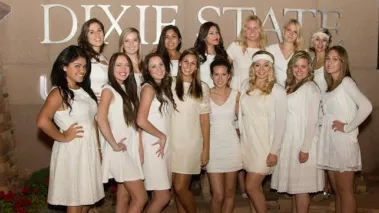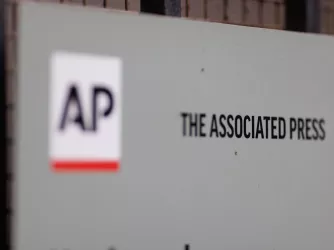Table of Contents
Dixie State Dean Relies on Attorney General's Incorrect Legal Analysis

Despite continuing pressure on Dixie State University administrators to acknowledge and uphold students’ First Amendment rights to free expression and freedom of association, Dixie State has reiterated its refusal to officially recognize student group Phi Beta Pi because the group name has Greek letters in it. According to the Dixie Sun News student newspaper, Dean of Students Del Beatty won’t budge on the issue: “Beatty said the attorney general told [the administrators] there is no problem and urges DSU to ignore the media’s pressure because there is no valid case.”
Let’s take a closer look at the language Beatty is relying on.
Utah Assistant Attorney General D. Michael Carter wrote to FIRE on September 6:
I would respectfully assert that Dixie State University’s policy restriction of Greek letters ... is narrowly tailored to serve its compelling interest to avoid the “party image” often associated with such organizations.
This question—whether the restriction on expression through Greek letters is “narrowly tailored to serve [a] compelling interest”—is often at the heart of cases involving content-based restrictions on speech. In the past, the Supreme Court has found, for example, that the government has a compelling interest in preventing the abuse inherent in creating child pornography. On the other hand, it concluded that California did not assert a compelling interest in prohibiting the sale or rental of violent video games to minors, because there was no reliable evidence that such games had significant harmful effects on children.
Where does “avoiding a party image” fall on that spectrum? It is difficult to imagine any sufficiently severe repercussions of such an image, particularly when taking into account the respected institutions often found in various “party school” rankings. And if preventing the school from obtaining a “party image” is compelling, one would think that preventing a reputation for rudeness and incivility would be similarly “compelling,” allowing schools the freedom to ignore the First Amendment and enact stringent speech codes. Of course, the long history of successful litigation against speech codes proves otherwise.
Considering this proffered rationale further, how far does Beatty think the school is empowered to venture in protecting the school’s reputation? If there were, in fact, myriad wild parties on campus, does Beatty (or the Assistant Attorney General) really think Dixie State could lawfully prevent the student newspaper from reporting on them?
Or perhaps the school’s past recognition of the “Organization of Good Parties” (an officially recognized student organization at Dixie State) makes the issue moot altogether.
Later in his letter, and again in his second letter to FIRE on October 24, Assistant Attorney General Carter refers to Dixie State’s ban on Greek letters as a “time, place, and manner” restriction, a kind of limitation on speech that is sometimes permissible under the First Amendment. Legitimate time, place, and manner restrictions could include, for example, disallowing parades after 2:00 a.m. or prohibiting demonstrations just outside classroom windows. However, time, place, and manner restrictions must be content-neutral—in other words, they must be justified without reference to the content or meaning of the speech.
But here, quite the opposite is the case. By the administration’s own admission, Greek letters are bannedbecause they are alleged to convey a certain meaning. Dixie State’s “compelling interest” in enacting the ban is plainly contrary to Carter’s assertion that “there is no ‘content-based’ ... restriction that anyone could reasonably find” in the ban.
Phi Beta Pi wants to identify itself with a name that conveys the group’s focus on sisterhood and community service, goals shared by sororities nationwide. Neither Beatty nor the Attorney General’s office may, consistent with the First Amendment, ban Greek letters for the message he thinks they convey. Protecting the school from being judged as a “party school” is not a compelling interest—not in the legal sense—and banning letters simply for their perceived expressive value does not constitute a permissible “time, place, and manner” restriction. Beatty told the Dixie Sun News that the “nuisance” of media attention to the case makes the administration “want to dig their heels in the ground even more.” Maybe this remark reveals the real reason for Dixie State’s continued ban on Greek letters: not legal justification, but childish stubbornness.
Recent Articles
FIRE’s award-winning Newsdesk covers the free speech news you need to stay informed.

White House barring AP from press events violates the First Amendment

FIRE opposes Virginia’s proposed regulation of candidate deepfakes

Love, loyalty, and liberty: ASU alumni unite to defend free speech
